Cyanidium
D. Wilson FreshwaterTaxa indicated by '*' are members of the traditional Bangiophyceae/Bangiophycidae that is now considered to be paraphyletic.
Introduction
The Rhodophyta (red algae) are a distinct eukaryotic lineage characterized by the accessory photosynthetic pigments phycoerythrin, phycocyanin and allophycocyanins arranged in phycobilisomes, and the absence of flagella and centrioles (Woelkerling 1990). This is a large assemblage of between 2500 and 6000 species in about 670 largely marine genera (Woelkerling 1990) that predominate along the coastal and continental shelf areas of tropical, temperate and cold-water regions (Lüning 1990). Red algae are ecologically significant as primary producers, providers of structural habitat for other marine organisms, and their important role in the primary establishment and maintenance of coral reefs. Some red algae are economically important as providers of food and gels. For this reason, extensive farming and natural harvest of red algae occurs in numerous areas of the world.

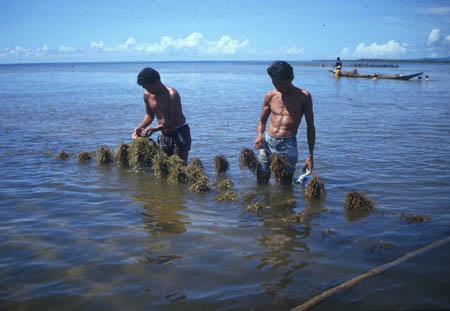
Figure 1. Seaweed farmers tending a Kappaphycus line culture in the Philippines.
Kappaphycus and other Gigartinales species are grown commercially for the extraction of carrageenan, a gel used in many food products.
Image copyright © 2000, D. F. Kapraun.
Characteristics
Red algae have a number of general characteristics that in combination distinguish them from other eukaryotic groups:
- absence of flagella and centrioles
- floridean starch as a storage product and the storage of starch in the cytoplasm (Figure 2)
- phycoerythrin, phycocyanin, and allophycocyanin as accessory pigments
- unstacked thylakoids in plastids (Figure 3)
- no chloroplast endoplasmic reticulum

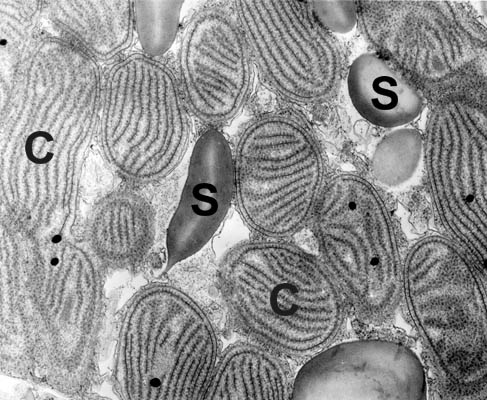
Figure 2. Griffithsia pacifica (Florideophyceae). Electron micrograph
showing cytoplasm with numerous chloroplasts (C) and starch (S). Starch is the photosynthetic reserve and is deposited free in the cytoplasm.
Image copyright © 2000, C. M. Pueschel.

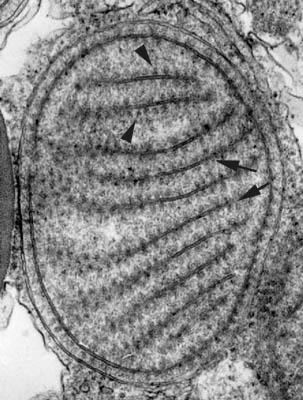
Figure 3. Griffithsia pacifica (Florideophyceae). Close-up of figure 2 electron micrograph showing a chloroplast with unstacked photosynthetic lamellae (arrows) bearing granules, called phycobilosomes (arrowheads), composed of water-soluble phycobiliprotein accessory pigments.
Image copyright © 2000, C. M. Pueschel.
Discussion of Phylogenetic Relationships
Traditionally the red algae were divided into two Classes the Bangiophyceae and Florideophyceae. Alternatively a single Class, the Rhodophyceae and two Subclasses, Bangiophycidae and Florideophycidae are used. Based on ultrastructure and molecular evidence the Bangiophyceae is now accepted as a paraphyletic group, while the Florideophyceae is considered to be monophyletic based on two synapomorphic characters - presence of a filamentous gonimoblast and tetrasporangia (Garbary & Gabrielson 1990 [and references within], Ragan et al. 1994).
References
Garbary, D.J. & Gabrielson, P.W. 1990. Taxonomy and evolution. Pages 477-498 in Biology of the red algae (K.M. Cole and R.G. Sheath, eds.). Cambridge University Press, Cambridge.
Lüning, K. 1990. Seaweeds: Their environment, biogeography, and ecophysiology. Wiley, New York.
Ragan, M.A., C.J. Bird, E.L. Rice, R.R. Gutell, C.A. Murphy and R.K. Singh. 1994. A molecular phylogeny of the marine red algae (Rhodophyta) based on the nuclear small-subunit rRNA gene. Proc. Natl. Acad. Sci. USA 91:7276-7280.
Woelkerling, W.J. 1990. An introduction. Pages 1-6 in Biology of the red algae (K.M. Cole and R.G. Sheath, eds.). Cambridge University Press, Cambridge.
Information on the Internet
- Introduction to the Rhodophyta. UCMP Berkeley, California, USA.
- The Seaweeds Home Page. University of Louisiana at Lafayette, Louisiana, USA.
- The Seaweed Homepage. Michael Guiry, University College of Ireland-Galway, Ireland.
- Algae. National Museum of Natural History. Smithsonian Institution. Washington, D. C., USA.
- The World of Algae. Derek Keats, University of the Western Cape, Bellville (Cape Town), South Africa.
- Algae Home Page. Ohio University, Athens, Ohio, USA.
- Algae: The Forgotten Treasure of Tide Pools. Images of California seaweeds. Sonoma State University, California, USA.
- The Nature-Printed British Sea-Weeds. Volume 1. (1868). A history, accompanied by figures and dissections, of the algae of the British Isles, William Grosart Johnstone, Alexander Croall. Kurt Stüber's Online Library.
Title Illustrations

| Scientific Name | Kallymenia perforata |
|---|---|
| Location | Collected from coral reef near Zamboanga, Mindanao, Philippines |
| Comments | Florideophyceae |
| Image Use |
 This media file is licensed under the Creative Commons Attribution-NonCommercial License - Version 3.0. This media file is licensed under the Creative Commons Attribution-NonCommercial License - Version 3.0.
|
| Copyright |
© 2000

|
| Scientific Name | Gibsmithia hawaiiensis |
|---|---|
| Location | Collected from coral reef near Zamboanga, Mindanao, Philippines |
| Comments | Florideophyceae |
| Image Use |
 This media file is licensed under the Creative Commons Attribution-NonCommercial License - Version 3.0. This media file is licensed under the Creative Commons Attribution-NonCommercial License - Version 3.0.
|
| Copyright |
© 2000

|
| Scientific Name | Porphyra carolinensis |
|---|---|
| Location | Masonboro Island, North Carolina, USA |
| Comments | Bangiales. Growing on rocks in the upper intertidal zone. |
| Image Use |
 This media file is licensed under the Creative Commons Attribution-NonCommercial License - Version 3.0. This media file is licensed under the Creative Commons Attribution-NonCommercial License - Version 3.0.
|
| Copyright |
© 2000

|
About This Page
The author wishes to thank G. W. Saunders for helpful comments, D. F. Kapraun and C. M. Pueschel for photos, and Katja-Sabine Schulz for invaluable help with the building of this page. Support for this page was provided in part by the National Science Foundation.

University of North Carolina, Wilmington, North Carolina, USA
Correspondence regarding this page should be directed to D. Wilson Freshwater at
Page copyright © 2009
 Page: Tree of Life
Cyanidium.
Authored by
D. Wilson Freshwater.
The TEXT of this page is licensed under the
Creative Commons Attribution License - Version 3.0. Note that images and other media
featured on this page are each governed by their own license, and they may or may not be available
for reuse. Click on an image or a media link to access the media data window, which provides the
relevant licensing information. For the general terms and conditions of ToL material reuse and
redistribution, please see the Tree of Life Copyright
Policies.
Page: Tree of Life
Cyanidium.
Authored by
D. Wilson Freshwater.
The TEXT of this page is licensed under the
Creative Commons Attribution License - Version 3.0. Note that images and other media
featured on this page are each governed by their own license, and they may or may not be available
for reuse. Click on an image or a media link to access the media data window, which provides the
relevant licensing information. For the general terms and conditions of ToL material reuse and
redistribution, please see the Tree of Life Copyright
Policies.
- First online 24 March 2000
Citing this page:
Freshwater, D. Wilson. 2000. Cyanidium. Version 24 March 2000 (under construction). http://tolweb.org/Rhodophyta/2381/2000.03.24 in The Tree of Life Web Project, http://tolweb.org/




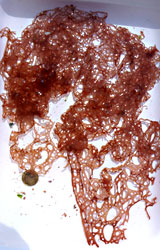

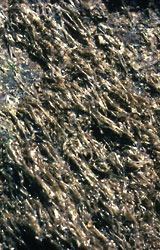

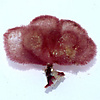



 Go to quick links
Go to quick search
Go to navigation for this section of the ToL site
Go to detailed links for the ToL site
Go to quick links
Go to quick search
Go to navigation for this section of the ToL site
Go to detailed links for the ToL site